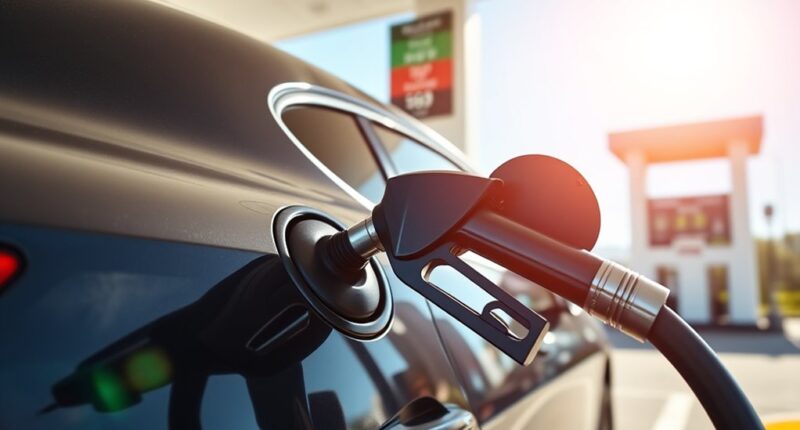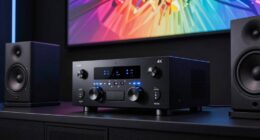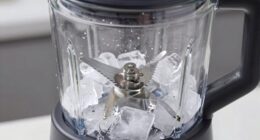To save hundreds on gas, focus on simple tricks like keeping your tires properly inflated and swapping out dirty air filters. Regular engine maintenance, such as tuning and replacing spark plugs and fuel filters, also boosts efficiency. Drive smoothly by accelerating gradually and avoiding abrupt stops. These habits, combined with proper vehicle upkeep, can markedly improve your fuel economy. Stick around to discover more easy tips that can make a real difference.
Key Takeaways
- Regularly maintain and replace air filters, spark plugs, and fuel filters to ensure efficient engine operation.
- Properly tune your engine’s air-fuel mixture and ignition timing for optimal combustion.
- Keep tires properly inflated to reduce rolling resistance and improve fuel economy.
- Practice smooth driving habits, such as gradual acceleration and avoiding abrupt stops.
- Use onboard diagnostics to identify and fix issues that may reduce fuel efficiency.

Optimizing your gas usage can considerably save you money and improve your vehicle’s performance. One of the most effective ways to do this is by focusing on enhancing your fuel economy. When your vehicle consumes less fuel to cover the same distance, you save money at the pump and reduce your environmental impact. The key to better fuel economy often lies in proper engine tuning. Regularly tuning your engine ensures it runs efficiently, which directly impacts your gas mileage. If your engine isn’t properly tuned, it can burn more fuel than necessary, decreasing your overall fuel economy and costing you more in the long run.
Optimizing your engine tuning can significantly boost fuel efficiency and save you money.
To start, make sure your engine is well-maintained. Regularly check and replace air filters, spark plugs, and fuel filters as needed. Dirty or worn-out filters can restrict airflow or cause misfires, leading to inefficient combustion. Proper engine tuning involves adjusting the air-fuel mixture to ideal levels, ensuring complete combustion and maximum fuel efficiency. Many modern vehicles have onboard diagnostic systems that can alert you to issues affecting fuel economy, but a professional tune-up can fine-tune your engine for peak performance.
Another way to improve fuel economy through engine tuning is by optimizing your ignition timing. If your spark plugs ignite the fuel-air mixture at the right moment, your engine runs smoother and consumes less fuel. Many vehicles benefit from a professional inspection to set the timing correctly. Additionally, consider checking your vehicle’s idle speed; an idle that’s set too high wastes fuel and reduces efficiency. Properly calibrated idle speeds allow your engine to run smoothly without unnecessary fuel consumption.
Aside from engine tuning, driving habits play a significant role in fuel economy. Accelerate gradually, avoid rapid starts and stops, and maintain steady speeds on highways. Keeping your tires properly inflated also improves efficiency because under-inflated tires increase rolling resistance, causing your engine to work harder and burn more fuel. Combining good driving habits with regular engine tuning creates a synergy that maximizes your fuel economy. For optimal results, consider regular vehicle maintenance as an essential part of your strategy to save fuel and extend your vehicle’s lifespan.
Frequently Asked Questions
Can Switching Gas Providers Reduce My Overall Costs?
Switching gas providers can definitely lower your costs if you explore different pricing strategies and loyalty programs. By comparing offers, you might find better rates or incentives that save you money. Many providers offer loyalty rewards or discounts for regular customers, so switching could open these benefits. Keep an eye on promotions and terms, and you could see significant savings over time just by choosing the right provider for your needs.
Are There Specific Times to Refill My Gas Tank for Savings?
You might wonder about the best fuel station timing for savings. To find ideal refuel moments, avoid peak hours like weekends or evenings when prices often rise. Instead, visit early mornings or mid-week when prices tend to be lower. Keeping an eye on local fuel price trends can help you identify the best times to refill your tank, ultimately saving you money on each fill-up.
How Do Weather Conditions Affect Gas Efficiency?
Weather conditions profoundly impact your gas efficiency. During temperature fluctuations, your engine works harder to reach ideal performance, reducing fuel economy. Cold weather thickens oil and causes your engine to run less efficiently, while hot weather can increase air conditioning use, draining fuel. Sudden weather changes or extreme patterns can also affect driving habits, making it essential to adapt your driving and maintenance routines to maintain better fuel efficiency in varying weather patterns.
Do Vehicle Maintenance Habits Impact Gas Consumption?
Your vehicle maintenance habits considerably impact gas consumption. Regularly checking tire pressure guarantees your tires are properly inflated, reducing rolling resistance and improving efficiency. Additionally, engine tuning keeps your engine running smoothly, maximizing fuel economy. Neglecting these habits can lead to increased fuel use and higher costs. By maintaining ideal tire pressure and engine tuning, you can save money and enhance your vehicle’s overall performance.
What Are the Best Apps to Monitor Gas Prices Locally?
You want to find the best apps to monitor fuel prices at local gas stations. Fuel price apps like GasBuddy, Waze, and AAA Mobile help you compare prices nearby, saving you money. These apps use real-time updates to show current rates, so you can plan your trips around the cheapest fuel. Download one today to stay informed and make smarter, cost-effective fueling decisions every time you fill up.
Conclusion
By applying these gas optimization tricks, you can save hundreds on your fuel expenses. Simple habits like maintaining proper tire pressure, driving smoothly, and reducing idling make a big difference. Regular vehicle maintenance also guarantees your car runs efficiently. Start implementing these tips today, and you’ll notice the savings add up over time. Don’t wait—small changes now can lead to significant fuel cost reductions and a more budget-friendly driving experience.









